#Nature of Evil
Text
Mythraism
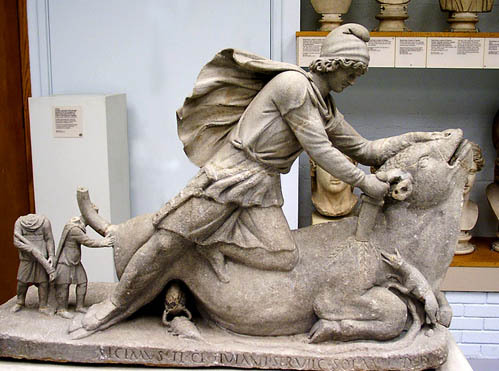
View On WordPress
#Evil#Good#Hllenistic#Mitanni#Mithras#Mythraic temples#Mythraism#Nature of Evil#Rituals#Roman Empiere#Roman Empire#Tauroctony
2 notes
·
View notes
Text
"Epic Majesty: John Milton's 'Paradise Lost' and the Theological Tapestry of the Human Condition"

John Milton's "Paradise Lost" stands as an unparalleled epic that delves into the cosmic realms of theology, morality, and the human experience. Published in 1667, this monumental work continues to resonate across centuries, offering readers an expansive canvas upon which the grand tapestry of creation, rebellion, and redemption unfolds. The title itself evokes the poignant irony of a paradise lost and the intricate theological explorations that define Milton's magnum opus.
The narrative centers on the biblical tale of the Fall of Man, tracing the events from Satan's rebellion in Heaven to Adam and Eve's expulsion from the Garden of Eden. Milton's blank verse is a majestic river of language, a flowing current that navigates through the celestial and terrestrial landscapes with a divine eloquence. The poetic richness and rhythmic cadence of Milton's verses contribute to the epic grandeur of the work, elevating it to the status of one of the greatest literary achievements in the English language.
At the heart of "Paradise Lost" lies the enigmatic figure of Satan, a rebellious angel whose defiance of God sets in motion the cosmic drama. Milton's portrayal of Satan is complex and multifaceted, challenging readers to grapple with questions of free will, pride, and the nature of evil. The character of Satan becomes a tragic figure, a charismatic and flawed entity whose rebellion is fueled by a misguided sense of autonomy.
Milton's exploration of Adam and Eve, the first human couple, adds another layer to the theological discourse. Their innocence, fallibility, and subsequent expulsion from Eden become symbolic of the broader human experience—caught between the desire for knowledge and the consequences of disobedience. The interplay between free will, temptation, and the inevitability of divine judgment forms the thematic backbone of the narrative.
"Paradise Lost" also engages with profound theological questions, reflecting Milton's own Puritan convictions and his dissent against the hierarchical structure of the Church of England. The work contemplates the nature of God, the problem of evil, and the redemptive power of divine grace. Milton's theological stance, however, remains dynamic, allowing for diverse interpretations and sparking scholarly debates on the nuances of his religious beliefs.
The epic's enduring appeal lies not only in its theological depth but also in its universal themes that transcend religious boundaries. Milton's exploration of the human condition—its aspirations, flaws, and the perennial struggle between good and evil—resonates with readers across cultures and time periods. "Paradise Lost" serves as a testament to the enduring power of literature to grapple with fundamental questions of existence.
In conclusion, John Milton's "Paradise Lost" is a literary colossus that stands at the intersection of theology, philosophy, and literature. The title encapsulates the essence of the narrative—an epic portrayal of the cosmic struggle between divine order and human agency. Milton's poetic brilliance and profound exploration of theological themes ensure that "Paradise Lost" remains an ever-relevant masterpiece that invites readers to ponder the complexities of the human condition and the timeless quest for meaning in a world marked by both paradise and loss.
John Milton's "Paradise Lost" is available in Amazon in paperback 16.99$ and hardcover 24.99$ editions.
Number of pages: 469
Language: English
Rating: 9/10
Link of the book!
Review By: King's Cat
#John Milton#Paradise Lost#The Fall of Man#Theological epic#Biblical narrative#Cosmic drama#Blank verse#Grand tapestry#Creation#Rebellion#Redemption#Biblical tale#Satan#Divine eloquence#Epic grandeur#Literary achievement#English language#Free will#Pride#Nature of evil#Tragic figure#Charismatic#Flawed#Autonomy#Adam and Eve#Garden of Eden#First human couple#Human experience#Desire for knowledge#Consequences of disobedience
4 notes
·
View notes
Text
BRIAN ALDISS
The fatal error of much science fiction has been to subscribe to an optimism based on the idea that revolution, or a new gimmick, or a bunch of strong men, or an invasion of aliens, or the conquest of other planets, or the annihilation of half the world - in short, pretty nearly anything but the facing up to the integral and irredeemable nature of mankind - can bring about utopian situations. It is the old error of the externalization of evil.
0 notes
Text
"Epic Majesty: John Milton's 'Paradise Lost' and the Theological Tapestry of the Human Condition"
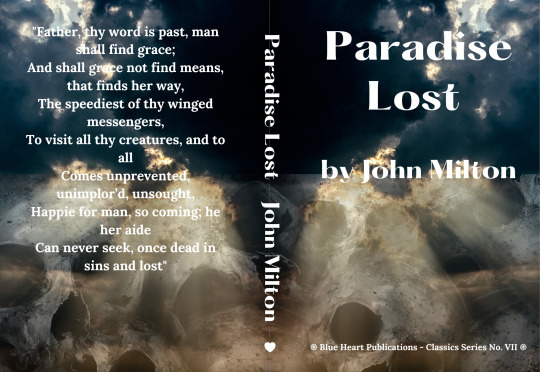
John Milton's "Paradise Lost" stands as an unparalleled epic that delves into the cosmic realms of theology, morality, and the human experience. Published in 1667, this monumental work continues to resonate across centuries, offering readers an expansive canvas upon which the grand tapestry of creation, rebellion, and redemption unfolds. The title itself evokes the poignant irony of a paradise lost and the intricate theological explorations that define Milton's magnum opus.
The narrative centers on the biblical tale of the Fall of Man, tracing the events from Satan's rebellion in Heaven to Adam and Eve's expulsion from the Garden of Eden. Milton's blank verse is a majestic river of language, a flowing current that navigates through the celestial and terrestrial landscapes with a divine eloquence. The poetic richness and rhythmic cadence of Milton's verses contribute to the epic grandeur of the work, elevating it to the status of one of the greatest literary achievements in the English language.
At the heart of "Paradise Lost" lies the enigmatic figure of Satan, a rebellious angel whose defiance of God sets in motion the cosmic drama. Milton's portrayal of Satan is complex and multifaceted, challenging readers to grapple with questions of free will, pride, and the nature of evil. The character of Satan becomes a tragic figure, a charismatic and flawed entity whose rebellion is fueled by a misguided sense of autonomy.
Milton's exploration of Adam and Eve, the first human couple, adds another layer to the theological discourse. Their innocence, fallibility, and subsequent expulsion from Eden become symbolic of the broader human experience—caught between the desire for knowledge and the consequences of disobedience. The interplay between free will, temptation, and the inevitability of divine judgment forms the thematic backbone of the narrative.
"Paradise Lost" also engages with profound theological questions, reflecting Milton's own Puritan convictions and his dissent against the hierarchical structure of the Church of England. The work contemplates the nature of God, the problem of evil, and the redemptive power of divine grace. Milton's theological stance, however, remains dynamic, allowing for diverse interpretations and sparking scholarly debates on the nuances of his religious beliefs.
The epic's enduring appeal lies not only in its theological depth but also in its universal themes that transcend religious boundaries. Milton's exploration of the human condition—its aspirations, flaws, and the perennial struggle between good and evil—resonates with readers across cultures and time periods. "Paradise Lost" serves as a testament to the enduring power of literature to grapple with fundamental questions of existence.
In conclusion, John Milton's "Paradise Lost" is a literary colossus that stands at the intersection of theology, philosophy, and literature. The title encapsulates the essence of the narrative—an epic portrayal of the cosmic struggle between divine order and human agency. Milton's poetic brilliance and profound exploration of theological themes ensure that "Paradise Lost" remains an ever-relevant masterpiece that invites readers to ponder the complexities of the human condition and the timeless quest for meaning in a world marked by both paradise and loss.
John Milton's "Paradise Lost" is available in Amazon in paperback 16.99$ and hardcover 24.99$ editions.
Number of pages: 469
Language: English
Rating: 9/10
Link of the book!
Review By: King's Cat
#John Milton#Paradise Lost#The Fall of Man#Theological epic#Biblical narrative#Cosmic drama#Blank verse#Grand tapestry#Creation#Rebellion#Redemption#Biblical tale#Satan#Divine eloquence#Epic grandeur#Literary achievement#English language#Free will#Pride#Nature of evil#Tragic figure#Charismatic#Flawed#Autonomy#Adam and Eve#Garden of Eden#First human couple#Human experience#Desire for knowledge#Consequences of disobedience
0 notes
Text
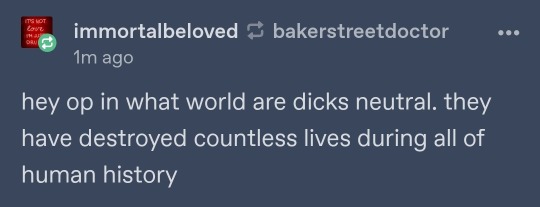
Terfs really think dicks are inherently weapons of mass destruction like??? What the FUCK are u saying lmao
71K notes
·
View notes
Text
Emotions are not evil. They exist for a reason, and should be listened to and respected.
What can be evil is how you respond to them, and that is entirely under your control.
1 note
·
View note
Text
right before this weeks episode i saw a noticeably higher uptick in horny kobeni on my twitter, from artists posting thicc kobeni to kobeni cosplayers showing their ass with some caption like "sloppy WHAT devil??"
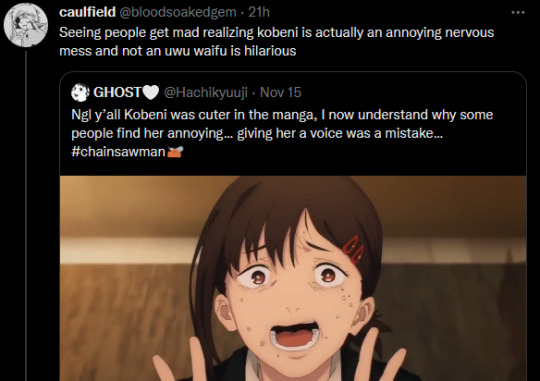
Kobeni stock reaches all time high before immediately collapsing. millions are left in shambles marking the event as one of the most devastating "is actually a failgirl and not a fetish" moments in history
#Market analyzers are left stunned and speechless#The future of makima stock is uncertain due to anime-onlys not knowing the depths of her evil nature
16K notes
·
View notes
Text
FFXIV players who want their WoL to kill the Elementals: "My WoL would be applauded for freeing the Shroud of their evil and their death will fix Gridania's shortcomings, prejudices, and xenophobia."
The actual likely consequences of that scenario:
#Final Fantasy XIV#FFXIV#Warrior of Light/Darkness#Gridania#Elementals#like gridania is in desperate need of more visible growth/development in the storytelling#but killing the elementals would NOT fix that#because they aren't “evil”#they're temperamental nature spirits with only semi-intelligence#they are the scapegoat for the actual issue#and not only would their death NOT solve that issue#it would also more than likely cause an ecological disaster XD
516 notes
·
View notes
Text
Demon Twin AU
Tim Drake comes across a LOA manuscript detailing the sacrifice of a Demon Heir that’s dated around the time Damian is born and brings it to the cave. There’s no other mention of what went down, but it looks like Damian was a twin and the twin was thrown into the Lazaras Pits- Tim kind of forgets about it but shows it to Damian cause he figures that the guy deserves to know, and leaves it out for Bruce to see (basically the same thing as telling him). It doesn’t really change much but there is an obscured name in the corner so they can presume that the kid’s name would have been something starting with D A N.
Well here’s the thing: Names carry power. Damian reaches out to John Constantine to ensure that the child is actually dead, because presumably John can do that. John wants to give the kid some closure, so he does what is supposed to be a super chill seance to an infant. He pricks Robin’s finger, chants a little and the air... turns violent.
Uh oh. Dan appears, unshackled from his prison in the Infinite Realms now that John has called upon them by someone with Familial blood. He cackles madly about the fact that it’ll be a good time to bring about the apocalypse again, promising to spare the bird for now, since he would have to get answers later.
The alarms are blaring, the whole JL is hands on deck to try and stop Dan as he attacks across the globe. They’re saving as many civilian lives as possible but its getting very HAIRY in less than 2 hrs. Robin is out in the chaos, trying to track him down with John and Zatanna trying to recapture him and banish him back to the realms.
Phantom touches down just as the three of them reach Dan- Danny has some choice words for his older alternate timeline self, including “This is why you have no friends.” and “Seriously, you didn’t even stop to say hi to my timeline’s Jazz this time.” and “Soup time for 1,000 years and then we can talk remediation.”
After a short but brutal fight, Danny floats over to Damian, John and Z. After making sure they’re all right he’s like “Maybe you can never do that again? Also tell me how and why you did that so I can banish that spell?” And Damian explains that it was meant to ensure that the infant twin he never knew had passed peacefully and clearly that was not the case. Danny blinks a few times, uh, a twin?
Damian goes through the shit, John explains that it was a familial summoning meant to be an advanced seance (hence the lack of safe guards to keep the entity in) and Z confirms that there was nothing special to it beyond that.
Danny then explains, that uh, “I guess my parents weren’t kidding when they told me I was adopted. Hi? I’m your brother. Uh, I go by Danny though. Dan was me in a different timeline and he’s normally under super strict lockdown.”
#demon twin au#dcxdp#dc x dp#dp x dc#danny phantom#damian wayne#Sometimes an apocalypse is the best way to bring a family together#fuck dan tho#I cannot stand his redemption arcs lmao#Damian is like god damn i really could have been way more evil if thats my twin#Danny is super excited that his bio family are all heroes#Danny throws shade at constantine of course#Damian and Danny naturally bond from that point onwards because like hey#neither of us are as evil or bad as we could be#how dope is that?#danny and damian are twins
3K notes
·
View notes
Text

Light practice ⋆ ✦❨ ⊹
#light yagami#yagami light#death note#death note fanart#dn fanart#my art#light continues to be hard to draw for some reason#but I think I've (finally) figured it out#at least a little bit#he's tricky#he's all at once youthful looking but also mature#and intelligent and manipulative#and so very evil#but also sort of pretty#but in a conventionally attractive way#and I have no idea how to juggle all of that in a single drawing of this guy lol#also probably doesn't help that I'm inclined to draw things cute#that's why Matsuda and Misa come so naturally hahahaha
554 notes
·
View notes
Text
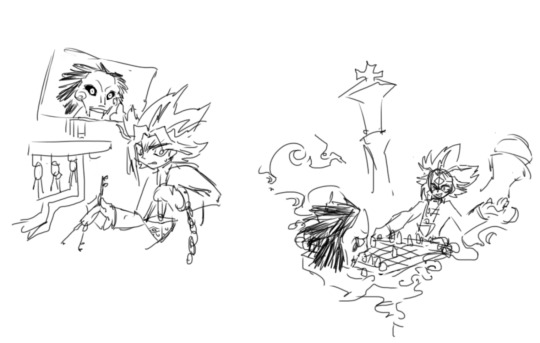
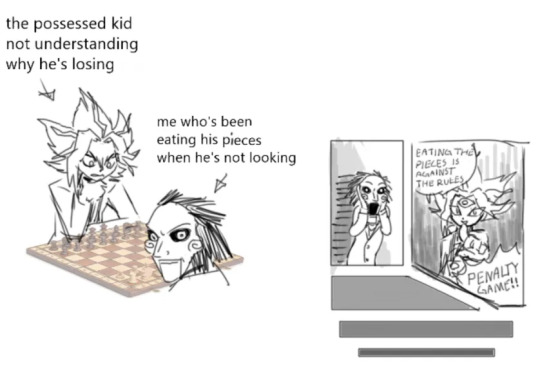
(person that has never seen saw but has read yugioh voice) yeah? so he traps people in evil puzzle rooms? sounds a lot like a guy i know
#yeah. im into drawing absurd crossovers now#feat. the stupid fuckign chess meme#ik the doll thing is just a doll but i keep seeing shitposts online that treat him as if hes not. i think it adds to it#no idea whats up with the formattign we'll see if it fixes itself after posing#(edit: it did not i had to re-add the second image)#i think yami yugi would survive a saw trap no problem. it's his natural environment#for that matter i also think he would survive squid game (ignoring the political messaging here. sorry.). he does that for a living#i've thought out how an evil chess shadow game would play out. even if it's not actually explained in the drawing#theres a time bomb on each side. you can prevent/regain time on yr side depending on the type of pieces you take. loser explodes#yami yugi would get a pawn across the board unnoticed turning it into a queen bc of course he would. prompting the opponent to cheat#getting themselves super penalty gamed#ygo#dm#s0#yugioh#idr my tags help#saw#(i guess???????)
681 notes
·
View notes
Text
Félix: kidnapping is a love language
Kagami: you have no social skills, idiot
*two weeks later*
Félix: okay, so when Marinette's at her most vulnerable, I'll gaslight her into thinking I'm her boyfriend, so she'll follow me into an abandoned building where we can put her in an altered mental state and present to her my family's life story in the imaginable most cryptic play of theater she has ever seen, which will reveal to her our horrible secret and the fact that her abusive father-in-law is also her arch-nemesis
Kagami: you're so big brained, bae 🥰
#I LOVE THEM BUT GOD THAT WAS THE LEAST SELF-EXPLANATORY WAY TO GO ABOUT THIS#fucking theater kids /lh#miraculous ladybug#ml spoilers#ml representation#ml representation spoilers#maybe they do team up nicely with Marinette because can ever be simple sfdgdfhgjfhg#I'm so pumped for the final ohmygodddd#also did you know I wrote a story in highschool where the son of the villain revealed his family's true nature to the MC#in a cryptic fairy tale. where he assigned his father as the evil prince who moved into the king's family and married the pricess#who ended up comatose and waiting for revival?#the moral of the story is we're all insane here and I cannot believe I literally wrote 30k about this#and not have the gall to diss on feligami they are the MVPs fgdhjdfhgfjgk#also props for being so much more useful going about this whole thing than Luka <3
2K notes
·
View notes
Note
Do you think your evil!bonnie and Circus Baby would get along or would they have each other?
Love your art btw it’s super cool!☺️❤️
omg... i think circus baby would find him weird and assume he as rabies KDSFGSDJH
and thank you so so much!!! <3333

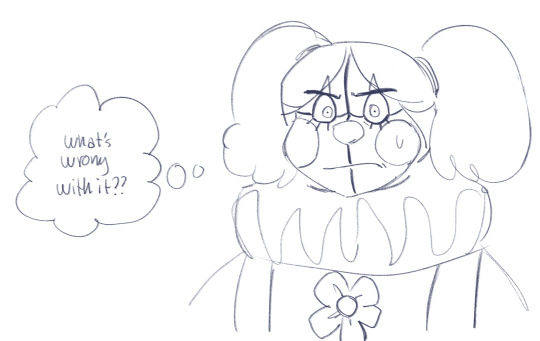
bonus:

#shes not getting close to that thing KDSJFSGD#tho she would find him interesting from his feral nature#finally did some of the funtimes in my style!!#hope you like em!!#art#fnaf#fnaf security breach#glamrock bonnie#evil!bonnie#fnaf au#fnaf sister location#fnaf circus baby#funtime freddy#fnaf bonbon
424 notes
·
View notes
Text
The Ballad of Songbirds and Snakes reviews I've seen fixate on the story's discussion of whether humans are inherently good or inherently evil as if one side or the other is the correct answer. Meanwhile the story itself is showing that individual choice in every action--choosing to act out of either love or self-interest--is what truly matters in shaping society. A free and stable society requires that people be taught to make selfless choices rather than act out of fear. Instead of oppressing people into fearful order, citizens need to have the freedom to choose the good, and be educated with the values that teach them what good is.
#the ballad of songbirds and snakes#the hunger games#i'm still mentally fighting with that christian review of the movie#'the movie discusses whether humans are inherently good or evil but the truth is we're depraved and need a savior'#and meanwhile i'm like#'well first off i don't think calvinist doctrine is going to help you here'#and i'm also like#you think the story*isn't* wrestling with the fallen nature of humanity?#you think it doesn't recognize that there's no merely human answer that can solve the problem of evil?#that we have to be fools by the world's standards to create a world worth living in?#can you actually understand what this very didactic story is telling you or do i have to do everything here?
507 notes
·
View notes
Text
I love Canon Remus and all of his flaws. Enough of this "Casanova of Gryffindor Tower" BS, Remus is the cowardly lion of Gryffindor tower. He values bravery because it is something that he lacks and yet still strives to be. He has an ingrained sense of shame and self-loathing and an inferiority complex that stems from society's contempt and marginalization towards Lycanthropy, a condition he was cursed with from a very young age. He wasn't a leader, he was a follower. A blind follower who believed to his core that he was unworthy of love and respect because of what he was.
Which opens the door to what I believe to be Remus' greatest flaw: His unwavering, unquestioning devotion to Albus Dumbledore.
I think Remus saw Dumbledore as the perfect encapsulation of Good. He was everything that Remus desperately wanted to be, everything that society was determined to believe a werewolf could never be. And maybe, if Remus could earn (and cling to) Dumbledore's favor and make him proud, he would prove to the world and himself that he is Good, too, in spite of his lifelong curse.
Remus felt that he owed Dumbledore a debt he could never hope to repay for allowing this chronically ill little boy into his school when no werewolf before him had ever been given such an opportunity. So many of Remus' choices in canon stem directly from this imagined debt that he had dedicated his life to paying. Hell, he didn't even hold a grudge against Snape for OUTING HIM to the entire wizarding world simply because Dumbledore trusted him.
Remus trusted Dumbledore wholeheartedly. And Dumbledore personally saw to Harry's placement with the Dursleys. Why should Remus have considered, for even a moment, that Harry wasn't safe? Certainly far safer than he would have been with a monster in close proximity, as Remus believed himself to be. In his mind, staying away from Harry was what was best for Harry. Until Dumbledore needed a favor, that is.
It's reductive to suggest that Remus failed Harry (and by extension, James) for putting his trust in Dumbledore to do right by Harry. James and Sirius trusted Dumbledore, too. They all did. Stripping away all of the nuance and blaming the abuse Harry suffered on Remus is simply unfair. NO ONE helped Harry, not even those who were fully equipped to do so, and Remus was the farthest thing from being equipped to take that on, what with being an impoverished werewolf living in a society that reviles his very existence. The only person who could have saved Harry from the abuse was the very man that placed him in that home, the very man that Remus revered with blind conviction.
#canon Remus is so complex and interesting#he's spineless and soft and consumed by self-loathing and fear#I think he was drawn to Sirius and James and Gryffindor House in general for the same reasons he was devoted to Dumbledore#He was quick to believe that Sirius was guilty because he had no confidence in himself to make his own judgement#He considered himself to be an inherent monster battling endlessly to supress his evil nature#and therefore placed all of his faith in those he believed to be Wholly Good#Reducing his character to “selfish manipulative coward” is a disservice#Also erasing these flaws in favor of the Fanon cocky asshole alpha male wattpad werewolf Remus is a massive disservice#remus lupin#marauders#character study#Canon Remus Defense Squad#i could rattle on and on about this topic for hours
415 notes
·
View notes
Text
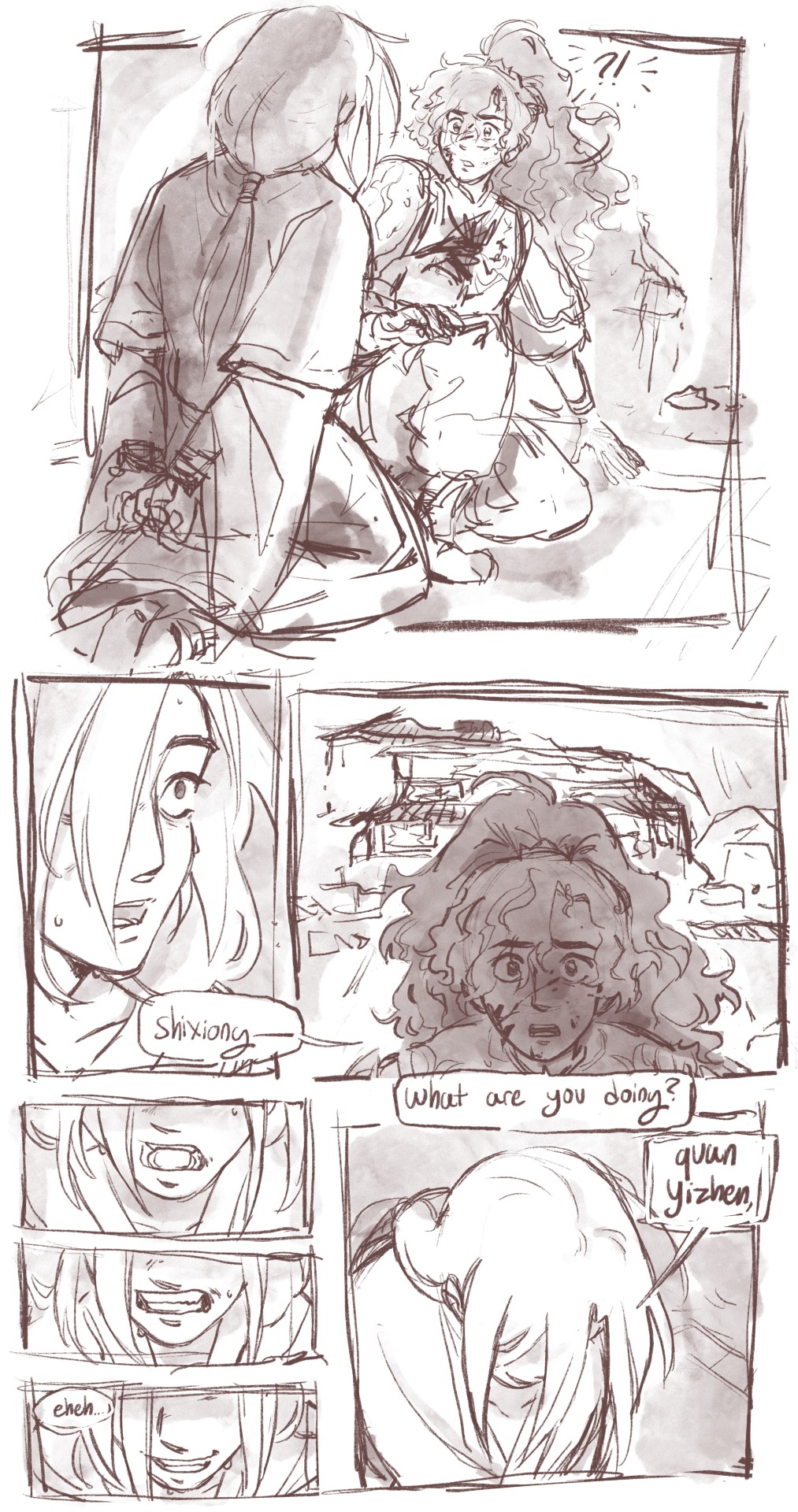
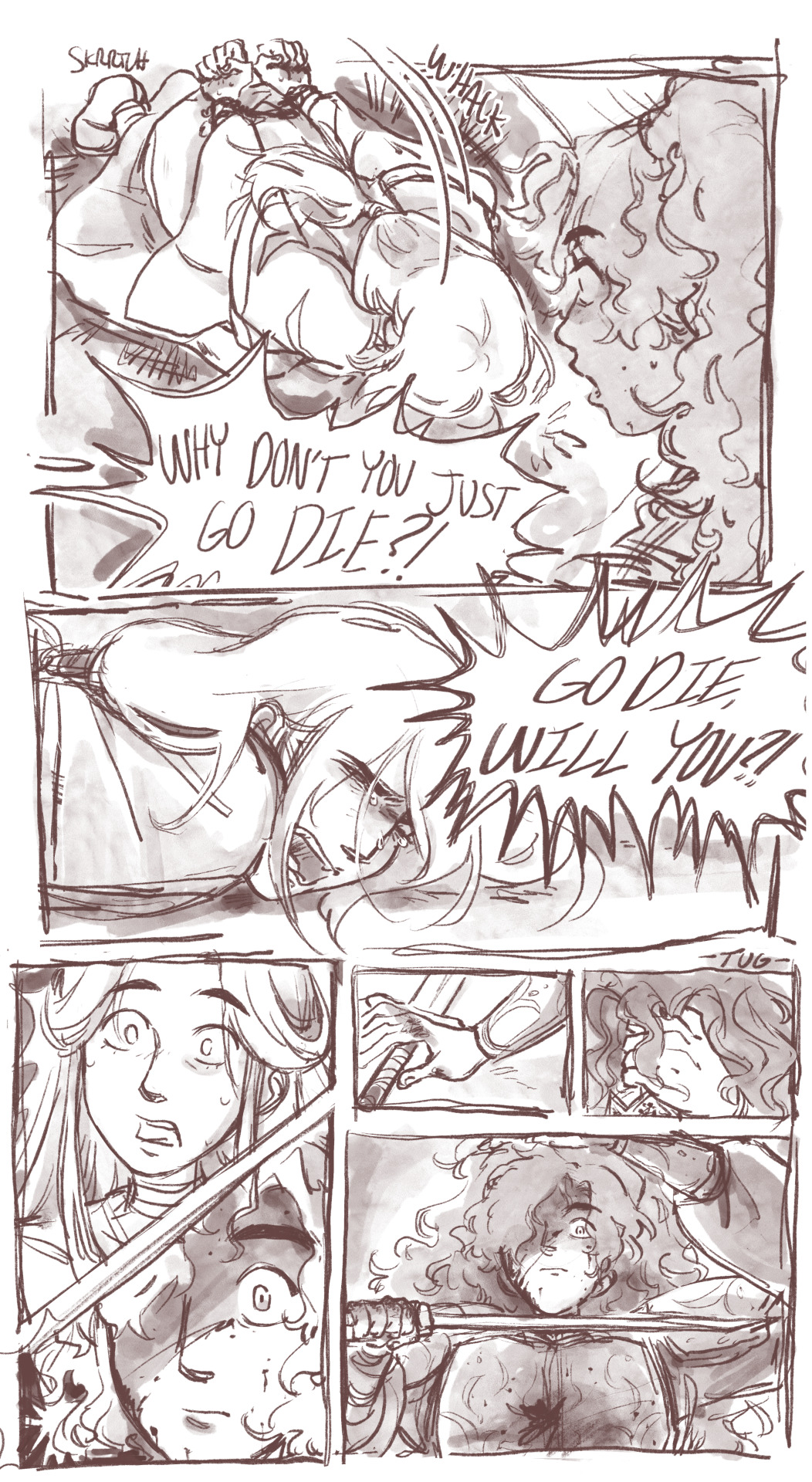
"at the sight of that completely oblivious face paired with the background of his smashed divine palace, yin yu was speechless."
[ chapter 84: this jade refuses to be a thrown-away brick ]
#heaven official's blessing#tgcf#yin yu#quan yizhen#quanyin#quanyin but evil#xie lian#i adored this chapter so naturally i had to draw a scene from it until 4 in the morning#i’m going into vol 6 rn surely nothing bad will happen
322 notes
·
View notes